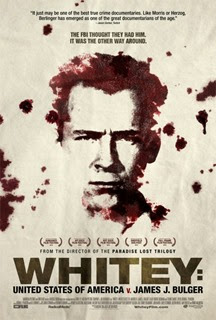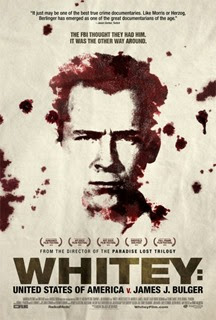Whitey: United States of America v. James J. Bulger
David Lynch Teaches Creativity and Film
 From Oscar-nominated director Joe Berlinger (Paradise Lost) comes this film, which follows the 2013 trial of Boston ex-mobster James “Whitey” Bulger. Bulger has ruled the organized crime world in Boston for over 25 years and was finally apprehended in 2011, after being on the run for 16 years, and charged with 19 counts of murder. The ensuing trial was less about about determining Bulger’s guilt in his crimes and more about Bulger’s claim that he was never an informant for the F.B.I., as they claim, and was instead granted immunity. Whitey: United States of America v. James J. Bulger listens to both sides of the story and tries to determine the truth to this case. This depiction of the trial of James “Whitey” Bulger shows that true crime stories like this one can be just as enthralling (if not more) than any Hollywood crime thriller (ironically, a Hollywood film about Bulger entitled Black Mass is scheduled for release next year). While Bulger did not really deny his guilt in many of his crimes, he denies that he was ever an informant for the Federal Bureau of Investigation. The film does indeed suggest there being quite a bit of corruption in the Boston branch of the F.B.I., with some even calling the Bureau “the most organized crime family on the planet.” Director Joe Berlinger is no stranger to true crime stories like this, having previously co-directed the trilogy of Paradise Lost films with Bruce Sinofsky. The film features some of Berlinger’s familiar tropes, particularly a helicopter shot set to rock music. Berlinger tries to stay neutral throughout the film and allows both sides of the case to have their say. However, the facts revealed in the film does make the “F.B.I. corruption” narrative seem somewhat more convincing than the “Bulger was just an informant” narrative given by the procession. Part of this bias towards the “FBI corruption” theory probably stems from how much of the film is built around a phone interview with Bulger from prison, who is obviously saying that he was never an F.B.I. informant. However, the film does give support of Bulger’s claims, particularly in how his F.B.I. file was inconsistent with that of other informants. It will probably remain unknown whether “Whitey” Bulger is telling the truth about never being an informant or whether he was merely trying to improve the narrative of his life, so he would be known as a “good bad guy,” who didn’t rat on his friends and didn’t murder women (which was also alleged). Altogether, Whitey is a very well done documentary, which even includes some surprising twists and turns. 9 | REALLY LIKED IT Whitey: United States of America v. James J. Bulger opens today at the Bloor Hot Docs Cinema
From Oscar-nominated director Joe Berlinger (Paradise Lost) comes this film, which follows the 2013 trial of Boston ex-mobster James “Whitey” Bulger. Bulger has ruled the organized crime world in Boston for over 25 years and was finally apprehended in 2011, after being on the run for 16 years, and charged with 19 counts of murder. The ensuing trial was less about about determining Bulger’s guilt in his crimes and more about Bulger’s claim that he was never an informant for the F.B.I., as they claim, and was instead granted immunity. Whitey: United States of America v. James J. Bulger listens to both sides of the story and tries to determine the truth to this case. This depiction of the trial of James “Whitey” Bulger shows that true crime stories like this one can be just as enthralling (if not more) than any Hollywood crime thriller (ironically, a Hollywood film about Bulger entitled Black Mass is scheduled for release next year). While Bulger did not really deny his guilt in many of his crimes, he denies that he was ever an informant for the Federal Bureau of Investigation. The film does indeed suggest there being quite a bit of corruption in the Boston branch of the F.B.I., with some even calling the Bureau “the most organized crime family on the planet.” Director Joe Berlinger is no stranger to true crime stories like this, having previously co-directed the trilogy of Paradise Lost films with Bruce Sinofsky. The film features some of Berlinger’s familiar tropes, particularly a helicopter shot set to rock music. Berlinger tries to stay neutral throughout the film and allows both sides of the case to have their say. However, the facts revealed in the film does make the “F.B.I. corruption” narrative seem somewhat more convincing than the “Bulger was just an informant” narrative given by the procession. Part of this bias towards the “FBI corruption” theory probably stems from how much of the film is built around a phone interview with Bulger from prison, who is obviously saying that he was never an F.B.I. informant. However, the film does give support of Bulger’s claims, particularly in how his F.B.I. file was inconsistent with that of other informants. It will probably remain unknown whether “Whitey” Bulger is telling the truth about never being an informant or whether he was merely trying to improve the narrative of his life, so he would be known as a “good bad guy,” who didn’t rat on his friends and didn’t murder women (which was also alleged). Altogether, Whitey is a very well done documentary, which even includes some surprising twists and turns. 9 | REALLY LIKED IT Whitey: United States of America v. James J. Bulger opens today at the Bloor Hot Docs Cinema

